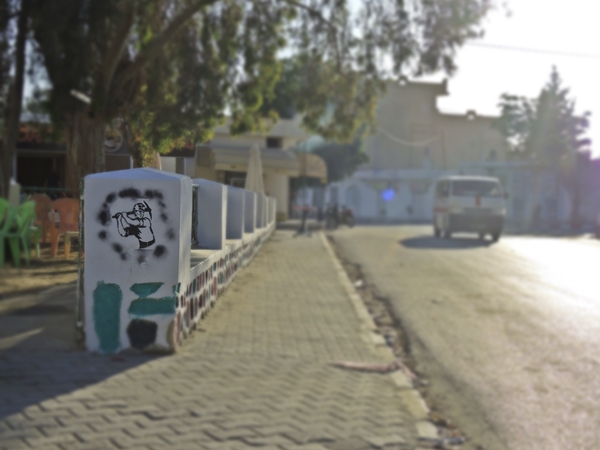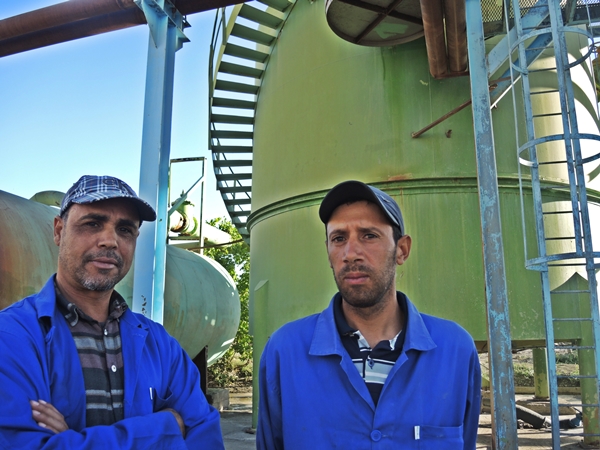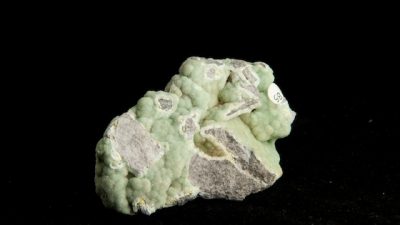Today Redeyef, Tunisia, is quite a scene: it’s a decrepit French colonial houses are surrounded by mountains of black phosphate sand, radioactive water lakes and its inhabitants, the vast majority unemployed, walk around with yellowish brown toothy smiles.
The main sounds are that of shuddering chains transporting phosphate, and sirens marking the beginning and end of working hours. The average life expectancy here is 60 years, as lung and colonic cancer, leukemia, kidney stones, rheumatism and tooth loss chip away at people’s lives.
Phosphate is a perverse affair for Redeyef: it has become the life and death of its people.
Phosphate is used in agriculture as fertilizer, and animal feed, but in dishwasher detergent, in soft drinks, and also as flame retardants and to treat water in water softeners. It is used to make cereal, produce chicken, make cheese, and to make ice cream, pudding, canned and fresh vegetables. It’s virtually everywhere unless you produce your own organic food. We can imagine its economic value.
The region of Gafsa in Tunisia is found in one of the largest phosphate basins in the world where Compagnie des phosphates de Gafsa (CPG), the fifth largest phosphate producer in the world, produces 8 million tons per year.
Redeyef, a community in the region of Gafsa, finds itself battling daily with the side effects of phosphate production.
Green Prophet meets Abed, father of four children, and soon two more, has worked in the water treatment sector for six years. He explains that the principle phosphate related activity in Redeyef is the “humid treatment”, that is washing, of phosphate which is bought here from all over the region by train.
This practice is highly polluting for two reasons: first the open sky black phosphate sand mountains, of which Redeyef is increasingly seeing itself surrounded by, blows in the desert winds entering into the homes, crops, mouths and lungs of its inhabitants.
Second, the water used to wash the phosphate is expelled into artificial lakes which infiltrates into the groundwater. This water, once used to water crops and drink, is now highly toxic, containing elevated concentrations of radioactive metals such as uranium and cadmium.
For years Redeyef has demanded to see some benefits from CPG’s activities. “All the money and richness goes to the capital and the state does nothing for the inhabitants of Redeyef. We are a forgotten town and region. Our land is sterile, our water is contaminated and we are sick, we have no hospitals to meet the demand of high cancer rates and our own citizens have to clean the streets. Who’s fault is this?” Abed asks.
Phosphate has become the death of self-sufficiency. With limited self-employment alternatives, phosphate has become the only other alternative for local employment- which CPG has not been able to fulfill.
In 2008 stifled protests and social movements erupted as CPG’s rigged employment procedures angered prospective workers, who have had enough of seeing political favoritism destroy the glimmers of hope for those who studied and sacrificed years of work to become more “employable”.
Redeyef, was the inedited site where those who had enough of Ben Ali’s regime began protesting. The “Jasmine revolution” in Tunisia, which snowballed into the so called Arab spring, began in Redeyef. Abed emphasizes “ the Tunisian revolution began here- it was a phosphate revolution before being a jasmine revolution.”
One could say that phosphate gave life to democracy in Tunisia.
Today the situation has not changed. Production halted for two months earlier this year because of protests, chefs promote for favoritism and not merit, the health of citizens is deteriorating, and unemployment rates are still amongst the highest in Tunisia. When talking about the future for Redeyef and Tunisia, Abed has little hope. He tells Green Prophet: “I think there will be worse protests in the future because there is high unemployment and phosphate is the only source of income for the region.”



